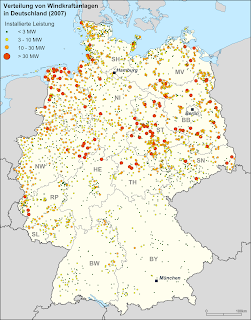Germany's Quixotic Withdrawal From Nuclear Energy
German Chancellor Angela Merkel hit the big red “stop” button earlier this year calling for the closure of all 17 nuclear reactors that provide about one-quarter of the nation’s electricity.
Eight reactors have been shut so far with the rest to be closed within another ten years. That’s a long time and a lot can happen.
While the rise of Russian natural gas supplies in the energy mix, and the political problems that will come with it, seems inevitable, there are other developments that are worth noting.
Germany’s overseas nuclear investments
Like Japan the paradoxical situation in Germany is that while the nation is winding down its commitment to nuclear energy, it is ramping up its exports to other nations. Brazil and the U.K. are two ‘go-to’ markets for German nuclear firms.
 |
| Angra 3 ~ image: World Nuclear News |
The Financial Times Deutschland reported in September that the German government is supporting the construction of a third nuclear reactor in Brazil.
Angra 3 will get a continuation of a {e}1.3 billion export credit. The construction contract for the project is headed by Areva, the French state-owned nuclear giant. The export credits sustain thousands of jobs in Germany.
Green groups in Germany, which are vociferously anti-nuclear, condemned the government’s decision to continue the financing arrangements. Sven-Christian Kindler, a spokesman for the Greens, called the move “schizophrenic” pointing out it makes no sense, in terms of the politics of his group, to turn off nuclear reactors in Germany while building one in Brazil.
He will need to get some more press releases ready because two leading German utilities are building new reactors in the U.K. German firms E.on and RWE plan to build at least 6 GWe of new nuclear reactor capacity in the U.K. at the Wylfa and Oldbury sites.
According to a Nov 17 Reuters report, Alan Raymant CEO of the joint U.K. venture of the two firms, called Horizon, said the project’s ambitions haven’t been impacted by events at Fukushima.
Germany’s hidden stumbling block to renewable energy
The problem for any energy producer is to get the power from the generating plant to rate payers. For wind and solar projects, the problem is even more acute because of their intermittent nature. No power is flowing through the grid of transmission lines if the wind doesn’t blow or the sun doesn’t shine.
Investors who want reliable returns on new transmission infrastructure are understandably skeptical of projects for which there will be tolls only part of the time. Grid operators have complained about having to intervene in load management as more solar and wind projects come online.
 |
| German wind power locations |
And getting new lines built, even with government subsidies, is going to be a dicey business. German citizens appear to be as opposed to new power lines going across the countryside as they are to nuclear power plants.
A Bloomberg wire service report for Nov 25 indicates that of 149 planned grid expansion projects, 73 or about half, are delayed by disputes.
The head of Germany’s electric power regulatory agency, Matrhias Kurth, told the wire service, “Energy transformation can only work if grid modernization keeps up with the expansion of reneweables.”
It turns out there is an answer to load balancing. It’s called coal or gas. According to a Nov 17 report in Platts, Germany’s Economic Minister Phillipp Roesler is calling for new fossil fuel plants to be built at the sites of decommissioned nuclear reactors. He told an energy conference in Leipzig that this strategy would take advantage of existing power lines.
Roesler told Platts the country needs 20 Gwe of fossil power to support the grid with some of it coming from Russian gas plants financed and built by Gazprom. Sergei Shymatko, a Russian energy official, reportedly told a German newspaper his country is ready to put up {e}15 billion in a joint venture with German utility RWE.
Czech Republic to the rescue
Czech Republic Prime Minister Petr Necas, who has committed CEZ, the state-owned electric utility, to build two new nuclear reactors at Temelin, and three more at other sites, is a bit nervous about how these plans will be received by Germany. That country could be CEZ’s largest customer for electricity from the new reactors.
Neas is meeting with German Chancellor Angela Merkel to assure her his intentions are honorable. He also wants her business. Additionally, the Czech Republic wants the reactors to develop independence from Russian gas supplies.
CEZ has released bid documents to three organizations - Areva, Westinghouse, and Atomstroyexport. The bids are due in July 2012.
The first two reactors will be built at Temelin, two more at Dukovany, and one in Solvenia. Taken together, the deal is estimated to be worth {e}21 billion and its Europe’s largest planned new nuclear construction effort.
Given that the Czech Republic shares a long western border with Germany, getting the power to its newest customer should help rescue that nation from its troubles keeping the grid stable.
It is a paradox that while Germany is slamming the door on nuclear energy at home, it is exporting technology overseas and importing nuclear powered electricity at home.
You can return to the main Market News page, or press the Back button on your browser.


